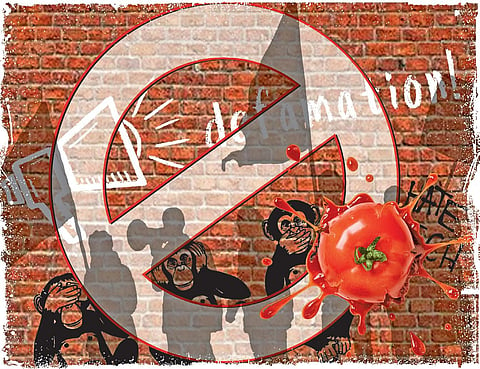

The recent disqualification of Rahul Gandhi from the Lok Sabha has highlighted how easily defamation law, which has criminal liability over and above civil in India, can be misused and applied to silence political opponents.
Depending on one’s political leanings, one can keep arguing the merits of this act and hide behind the argument that the law is following its due course. Disqualifying the leader of the largest Opposition party, however, on a defamation case that awarded a sentence of two years doesn’t augur well for our image as a democracy. Regardless of the technical merits of the case, it gives
a message that India is not evolving as a mature democracy, but regressing.
Many laws in India are freely used to silence criticism and target opponents like Section 295A of the Indian Penal Code, which deals with deliberate and malicious acts intended to outrage the religious feelings of any class by insulting its religion or religious beliefs; Section 2 of Prevention of Insults to National Honour Act, 1971; Sections 153A (promoting enmity between different religions); Section 505(2) (promoting enmity between classes) etc.
In Mahendra Singh Dhoni v. Yerraguntla Shyamsundar, an FIR was lodged against for former captain of the Indian cricket team. The image of Dhoni was portrayed as Lord Vishnu in the magazine with the heading ‘God of Big Deals’. Dhoni had to move to the Supreme Court to quash the FIR in 2017. There have been cases of comedians arrested without a warrant on Section 295A, journalists prosecuted for old Twitter comments etc.
The purpose of such cases is mostly intimidation and silencing the opponents than the purported objective of protecting religious sentiments. The more recent one was about the colour of a bikini that an actor wore in a Bollywood film that offended the religious sentiments of many people and led to a slew of criminal cases in various courts.
Even cartoonists are not spared under such vague colonial-era laws, and no government, irrespective of its political ideology, is free from misusing laws to silence those who oppose them. Lest someone claims that such actions are unique to the present government, here is an example of how the government, led then by the party in Opposition now, had used laws to stifle criticism.
In 2012, Mumbai-based cartoonist Aseem Trivedi was arrested under Section 124A (sedition), Section 66 of the IT Act and Section 2 of the Prevention of Insults to National Honour Act, 1971, for drawing a cartoon that was critical of government corruption. It was a blatant attempt by the state authorities to muzzle criticism using laws that can be easily manipulated for political purposes.
In 1999, Shiv Sena Supremo Bal Thackeray was stripped of his voting rights and debarred from contesting the polls by the election commission with retrospective effect from 1995. Every party in power has bent and interpreted laws and used the torture of facing the tedious court proceedings as a punishment tool to stifle the opposition.
In many democracies worldwide, defamation has ceased to be a criminal act. In the UK, criminal prosecution for defamation was abolished for most related offences in 2009. In the US, defamation is not a criminal offence at the federal level, but many states have criminal provisions for it. Since the US Supreme Court has restricted the application of such law and has stood for free speech, criminal convictions for defamation are rare.
Australia and New Zealand consider defamation only as a civil case. In India, where courts are overburdened and prisons overflow with undertrials (more than 77 per cent of prison inmates in 2021 were undertrials, waiting for conviction), it is atrocious to misuse the system to settle political scores.
Ultimately, defamation laws should not be used to restrict free speech or silence political opponents, journalists, cartoonists, comedians and ordinary citizens in any democracy. Considering defamation as a criminal offence, laws on hurting religious sentiments etc. raise serious questions about democracy and free speech in India.
Defamation should be treated primarily as a civil matter, and there should be no place for a blasphemy law in a secular country. Freedom of expression should be sacrosanct, and people should be able to express themselves freely without fear of facing jail time, disqualification, and fighting off FIRs in multiple police stations and cases in different courts for minor crimes. Else, a time will come when India, instead of being hailed as the largest democracy, will be seen as a failed one.
Anand Neelakantan
Author of Asura, Ajaya series, Vanara and Bahubali trilogy
mail@asura.co.in